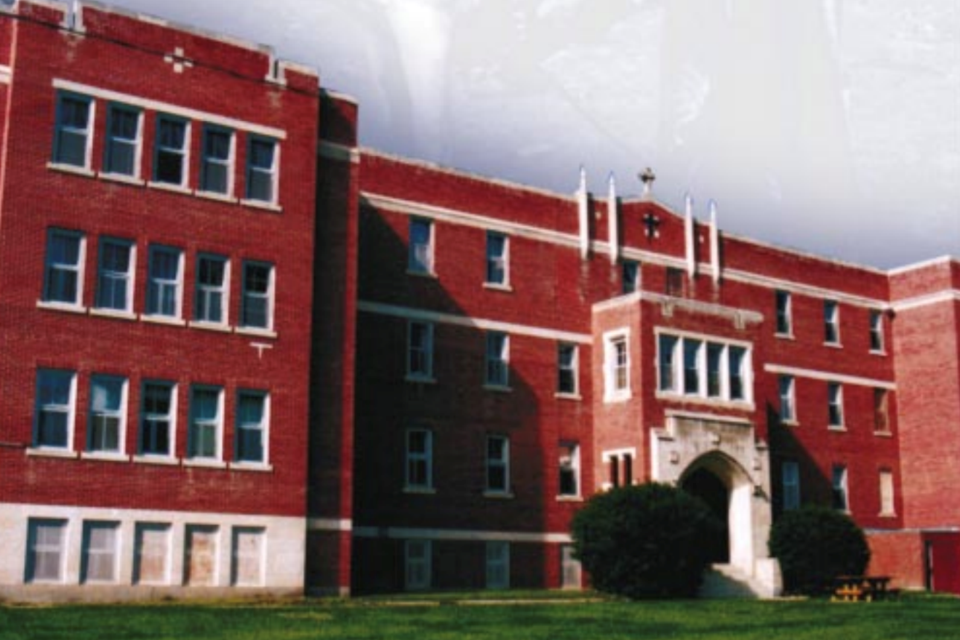ST. PAUL - University nuhelot’įne thaiyots’į nistameyimâkanak Blue Quills has spent the week sharing songs, prayers, stories and making offerings, during a ceremonial four-day fire at the university that once housed a residential school.
It's been a heavy week filled with reflection for many, following the confirmation of 215 children in an unmarked grave at the Kamloops Indian Residential School, a finding that is "a heart-breaking reminder of the continued effects of a genocidal system," according to president of UnBQ, Sherri Chisan.
The Blue Quills Indian Residential School was established in 1931, west of St. Paul. The building was officially turned over to a number of Indigenous communities in the area in the early 1970s, and now acts as a post-secondary institution with university status. A number of the programs offered at UnBQ now focus on preserving and teaching Indigenous languages.
Chisan confirmed that Blue Quills has been involved in a process to launch a similar investigation, and continues to collect the stories of survivors and their families, "to honour their voices and to support the healing of our people and the ones who have come to share our lands."
After days of reflection, Chisan offered a few more thoughts on the recent discovery.
"After a pipe ceremony yesterday (Wednesday), I watched the sun set as I sat by the ceremonial fire. I watched the sun rise at that fire this morning (Thursday). I shared the night at the fire with visitors, colleagues, friends, students, children," said Chisan, who says she was also joined by Terri Suntjens, Director of kihêw waciston at MacEwan University, who stayed with Chisan throughout the night.
"We witnessed the relations that came to the fire, the deer, the moose, the coyotes, the birds. We shared that fire with the spirits of the children who were lost to their families and will now find their way home, with the spirits of the children who still wait to be found," said Chisan.
"We are grieving. We know there are questions out there, but right now we need to grieve, to be there for and with one another, to share our stories, our songs, our prayers, our tears, our support. We will get to those questions, but for now we mourn. We are also preparing, knowing that there are more, and that each of them will be just as difficult."
She likened the current situation to another "chapter in the complicated relationship that is Canada," adding, "Perhaps this is the one that will open the door to a true reckoning."
At UnBQ, a vision inspired by ancestors who encouraged the creation of learning spaces, relationships and programs that honour Indigenous knowledges, languages, and ceremonies, continues to exist.
"Working in a former Indian Residential School is a challenge, a daily reminder of the atrocities that happened here, and of the work ahead of us," reads a statement from UnBQ, released earlier in the week.
"We draw on the strength of those ancestors and are motivate by our responsibility to the generations who will follow. We celebrate the resiliency of our people."
Province commits
Following the May 27 announcement about the findings in Kamloops, renewed calls to search properties of all former residential schools and similarly utilized institutions across Canada with ground-penetrating radar technology have been made.
The revelation has sparked the federal and provincial government to announce that funding is coming to help efforts to search the grounds and nearby areas of residential schools that existed in Canada from 1893 until 1996.
Alberta’s Minister of Indigenous Relations Rick Wilson, wrote in a statement Monday, “I am announcing the Alberta government’s intention to fund research into the undocumented deaths and burials of hundreds of Indigenous children who did not make their way home.”
So far, no additional details have been released on how much funding will be put toward the project or how it may be implemented in the province. However, the exploration of past residential school sites is something the Indigenous Relations Ministry says is important to begin repairing trust with First Nations Communities.
“Finding their graves is a matter of reconciliation and another step toward closure for families,” said Wilson. “Many of the schools have been destroyed and while their general location is known, the exact coordinates are missing. It is also possible that children were buried in locations such as nearby churches.”
Adding to the grim reality, Audrey Poitras, president for Alberta’s Métis Nation, says when increased funding allows for wider searches of historically relevant sites, there will be more of the same tragedy that was uncovered in British Columbia.
“It is entirely likely that this will not be the last mass burial site to be discovered,” Poitras said. “While this announcement from Minister Wilson is a good start, we need to see an immediate commitment of funds, resources, and a timeline.”
Poitras hopes the government's words are more than performative and that real action and change follow.
“History sadly supports our mistrust, but we hope that this devastating discovery is the catalyst for true reconciliation in this province.”
*With files from Jazmin Tremblay
Read more from LakelandToday.ca



